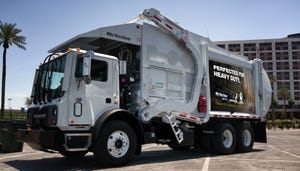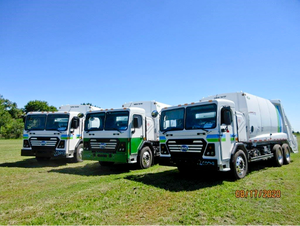Winn Reflects on Recyclebank’s Record
Waste360 talked to Recyclebank Executive Vice President Paul Winn about the organization’s evolution.
With more than a decade of operation under its belt as a platform aimed at understanding and incentivizing recycling, RecycleBank has produced some key findings about how Americans use (and misuse) their recycling bins.
The program has faced some challenges, including pulling out of a handful of markets. But for the most part the program has built a track record of success and extended its reach across the country.
Recyclebank was formed in 2004 as a B Corp. company (certified to meet social and environmental performance standards). It works mainly with cities, but the company also works with some businesses. Its clients pay for the Recylebank platform to learn about people’s recycling habits, to educate them and reward points, redeemable for gifts, for recycling.
The program now operates in 300 communities nationwide. It’s helped to divert 1.6 billion pounds of material and delivered $63 million in rewards to more than four million people.
Waste360 talked to Recyclebank Executive Vice President Paul Winn about the organization’s evolution, lessons learned and one of its great success stories.
Waste360: I understand data is key to what you do. How do you leverage data to boost recycling? And where does that data come from?
Paul Winn: We get data from three sources to learn about residents’ recycling behaviors and, ultimately, to help come up with ways to get them to recycle more and to do it effectively.
Our first source is program data generated by cities. We use it to identify contamination problems. And we use it to develop consumer education initiatives and targeted recycling programs.
We also have third-party data that is behavioral or demographic information looking for trends across regions. We glean what has worked elsewhere to apply in different locations.
And we have our own data on how people engage on the Recyclebank platform. It tells us what channel people connect through, such as our website or smart phone aps, to learn about recycling and for rewards And it tells us what they click on so we know what they’re interested in.
Collectively, these three data sources tell us that you recycle. We know you subscribe, for instance to Food and Wine magazine. We discover you clicked on a compost article on our site and downloaded a free gift card after completing a quiz.
Waste360: What have been the biggest changes in how Recyclebank works, and what has this meant?
Paul Winn: The biggest changes are in technology and how we reward people.
We used to rely on coupons, while now we do giveaways and contests as well as surprise delights where we randomly give out gift cards. I followed your recycle truck and saw you were a great recycler and handed you a gift.
As far as changes in technology, 12 years ago we invested in a radio frequency id (RFID) chip on recycle bins and a weight scale on trucks. This system enabled us to match each bin’s content to each house. We converted that data to points. Now haulers and cities implement their own technologies, which boosts our capabilities. RFID is more sophisticated and accurate. Plus, there are more tools like GPS. GPS is not quite as accurate as RFID, but less expensive, so it gives another option to track participation.
Other technologies have evolved that help us communicate with and engage people, like Facebook and other social media platforms.
Waste360: What have you most learned over the years?
Paul Winn: We learned people have different motivators and we need to modify the carrot based on profiles in a given city. We discovered for instance older people often like grocery store gift cards, and younger residents like movie tickets and other experiential rewards.
We are finding ways to incentivize that apply to various people in one community. And we are starting to develop themes that can be applied in many regions.
Waste360: Can you share a success story?
Paul Winn: Philadelphia has increased diversion by 29 percent over the last three years. This is the result of using data and education to address issues in specific neighborhoods rather than throughout the whole city. The improvement is also attributed to using multiple data sources.
Philadelphia can break down recycling data by district, route and even household. On top of that data, we map the third-party data and data from our platform. So when they have a new waste problem, we can know what works and where to effectively, quickly address that problem.
Waste360: What have been some setbacks and how have you addressed them?
Paul Winn: Economics of recycling are tough, making it hard for municipalities to make big, bold steps to do the right thing. But technology has advanced, and as it evolves, it’s become more cost effective to get messages out. Technology, data and multichannel approaches have helped us to understand, engage and motivate people.
About the Author(s)
You May Also Like




